National News Literacy Week 2024 coverage
The fifth annual National News Literacy Week turned a spotlight on local news and its role in a healthy democracy. Through free events for educators and the public, this initiative provided people of all ages with the knowledge and tools to become better informed and more civically engaged. NLP staff and partners shared their expertise with media outlets around the nation. Some highlights:
United Press International
“In a functioning democracy, high-quality local journalism is essential to ensuring that community leaders are working in the public’s best interest,” NLP President and CEO Charles Salter wrote, “Local news unites communities, serving as the proverbial ‘water cooler’…”
The Chicago Tribune
“We will never stop the supply of bad information. There will always be new sources that create and spread it and algorithms that promote it,” wrote David Hiller, a member of NLP’s National Journalism Advisory Council. “Instead, we must fix the demand side and ensure that everyone has the skills they need to separate fact from fiction and seek out quality news.”
Governing
“The increasing adoption of news literacy education is an acknowledgment that students need help understanding our chaotic media environment so they can become well-informed citizens with the skills to participate effectively and knowledgeably in our democracy at every level of government,” said Shaelynn Farnsworth, senior director of education partnership strategy at NLP. “Just because young people are digital natives doesn’t mean they can sort through and make sense of all the content that bombards them.”
The Fulcrum
“It’s easy to get angry when we’re confronted with misinformation — that’s what it’s designed to do,” said Susan Minichiello, senior manager of education design at NLP. “But learning how to sort fact from fiction online while also practicing empathy will go a long way in fixing the misinformation crisis.”
Scripps News Reports
“This year, news literacy is focusing on responsible sharing, something that’s become so important given how much Americans rely on social media for their news and information,” said Adam Symson, CEO of the E.W. Scripps Company. “So, we really want to focus on arming people with the tools they need in order to think before they share, in order to research before they start spreading.” Listen to the episode here.
Extra, extra: How to solve the local news crisis
7 p.m. ET Monday, Jan. 22, 2024. Doors open at 6:30 p.m.
National Press Club, 529 14th St. NW, Washington, D.C.
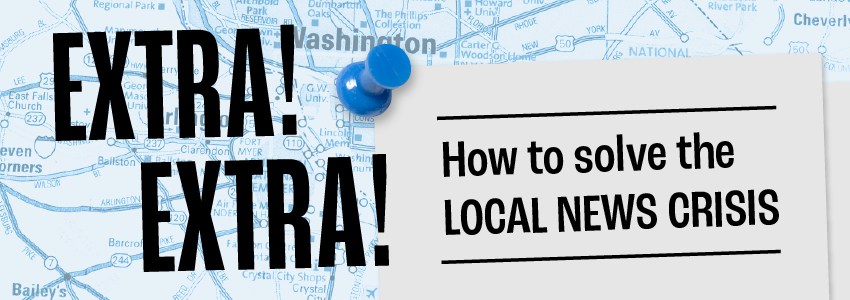
Extra, extra: How to solve the local news crisis
A live, in-person panel discussion featuring:
- Sarabeth Berman, CEO of the American Journalism Project
- Margaret Sullivan, author of Ghosting the News: Local Journalism and the Crisis of American Democracy
- Steven Waldman, founder and president of Rebuild Local News
- Kimi Yoshino, editor of The Baltimore Banner
- Moderated by Tracie Potts, executive director of the Eisenhower Institute
Program begins promptly at 7. Light hors d’oeuvres and refreshments will be served.
Join us as we kick off National News Literacy Week 2024! Seats are limited, so register today!
According to a 2022 Gallup/Knight Foundation survey, 67% of Americans say they regularly get local news from established sources such as broadcast TV, radio, newspapers or magazines. But since 2005, more than 2,500 newspapers in the U.S. – a quarter of them – have shut down. Research shows that when a local paper closes, communities experience lower voter turnout, decreased civic engagement, less accountability and increased polarization. With quality sources of local news in decline, our democracy is at risk.
That’s why our theme for National News Literacy Week 2024 is spotlight on local news. We must find solutions to the local news crisis so communities are well-informed and civically engaged. To explore these issues and kick off National News Literacy Week, we are hosting a distinguished panel of journalists, innovators, media critics and educators. They will discuss pressing issues facing local news coverage, how additional funding can help, and other possible solutions.
About the panelists
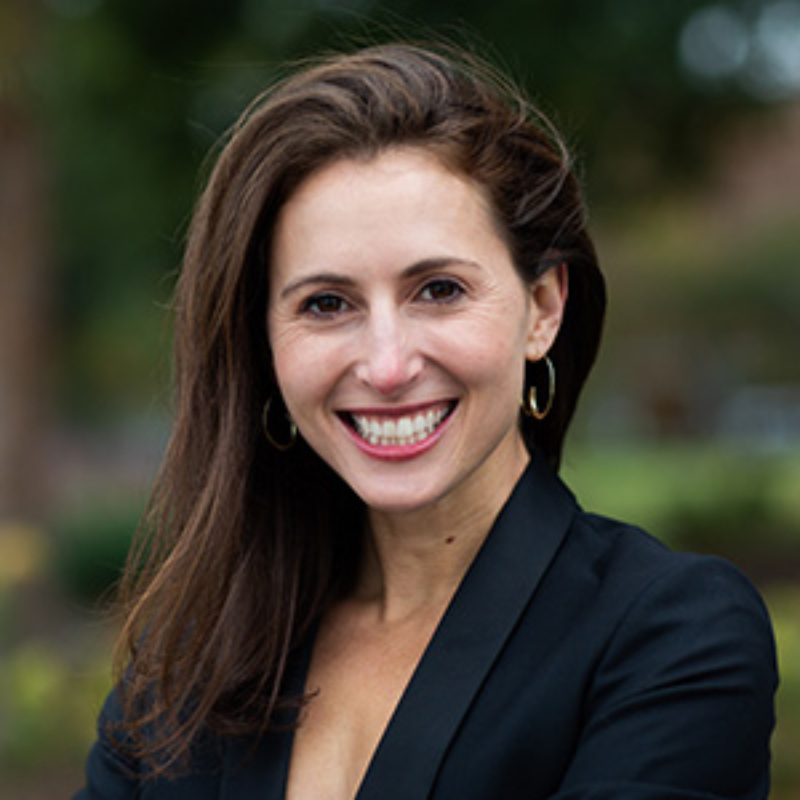
Sarabeth Berman serves as the chief executive officer of the American Journalism Project, the first venture philanthropy dedicated to local news. AJP makes grants to nonprofit local news organizations across the country, supporting the successful launch of new enterprises and partnering with existing news organizations to grow and sustain their businesses. Since launching in 2019, the organization has committed more than $44 million in investments in its growing portfolio of 37 nonprofit local news organizations.
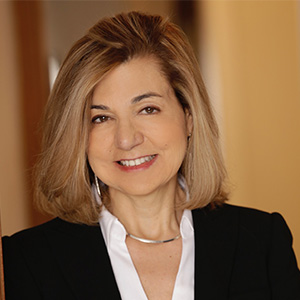
Margaret Sullivan is a weekly columnist for The Guardian, where she writes on media, politics and culture, and she will become the executive director for the Craig Newmark Center for Journalism Ethics and Security at Columbia Journalism School, Columbia University, on Jan. 1, 2024. Sullivan has published two acclaimed books, including Ghosting the News: Local Journalism and the Crisis of American Democracy and Newsroom Confidential: Lessons (and Worries) from an Ink-stained Life.

Steven Waldman is the founder and president of Rebuild Local News, which advocates for nonpartisan policies to increase reporting on local issues. He is also the co-founder and former president of Report for America, a national service program that places journalists in newsrooms across America. He previously covered national politics for Newsweek, U.S. News and World Report and the Washington Monthly.
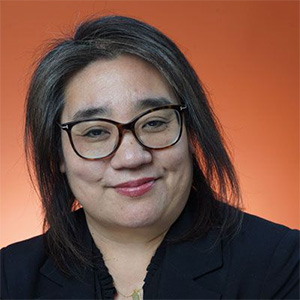
Kimi Yoshino is the editor in chief of The Baltimore Banner, a nonprofit local news outlet in Maryland. She was previously managing editor of the Los Angeles Times, where she worked for 21 years as a reporter, editor and strategic leader. She was a reporter at the Fresno Bee and the Stockton Record before joining The Times.
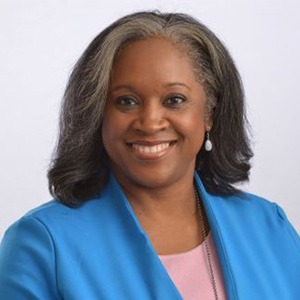
Tracie Potts is executive director of the Eisenhower Institute at Gettysburg College. She previously served as senior Washington Correspondent for NBC News, where she covered four presidential administrations, Congress and the federal government. She also was an anchor and reporter at local news stations in California.
NewsLitCamp®: The importance of local news
Join us on Jan. 26 for a National NewsLitCamp®️: The importance of local news, in partnership with E.W. Scripps Company, a virtual, immersive day of professional learning built exclusively for educators and part of our National News Literacy Week.

Friday, January 26, 2024
9 A.M. – 5 P.M. EST
The Importance of Local News — Especially During Election Season
Navigating news and information during an election year can be overwhelming. Often, major news organizations seemingly focus entirely on national politics. However, it can be that the most important races and issues, the ones that have the most impact on our lives, are typically found “down ballot.” To find news and information about state and local elections, we must turn to local news organizations.
Join us for NewsLitCamp during National News Literacy Week for a day of news literacy and journalism-focused professional learning with professionals from affiliates of Scripps. You will have an opportunity to connect directly with journalists and learn more about how to help students navigate our increasingly complex information landscape. You will also have an opportunity to build your content-area knowledge when it comes to news literacy topics for the classroom.
- The role of local reporting in national election coverage.
- Opportunities for creative classroom-to-newsroom partnerships.
- Local news, social media and sorting fact from fiction online: what local stations want teachers to know.
The first session starts at 9 a.m. ET with additional sessions continuing throughout the day until 5 p.m.
The event is open to all educators. No matter where you are or what grade level or subject area you teach, if you’re an educator interested in news literacy, we hope to see you there. There is no cost to attend.
Check out our online agenda, available on Eventbrite, to see session descriptions!
Can’t make the whole day but interested in a few sessions through the day? That’s great — you are welcome to attend the sessions that fit your schedule. Register now!
All sessions will be recorded and made available to everyone who registers after the event ends.
Questions? Email us at [email protected].
Behind the Scenes with the Washington Post TikTok Team
This free National News Literacy Week webinar for students and educators features a live, virtual conversation with the Washington Post TikTok team about news and social media.
Tuesday, Jan. 23, 2024
1-2 p.m. ET/10-11 a.m. PT
Social media plays such a large role in the lives of young people today that it is now one of the primary sources where young people receive their news and information, according to a 2022 report from the Reuters Institute. Given the evolution of Americans’ news consumption habits, the ever-changing social media landscape and the rise of generative AI, it’s never been more important to ensure the next generation can distinguish facts from fiction and interact with their social feeds in an informed, responsible way.
Here’s a chance for students to engage in a conversation about news and social media. Join us for “Behind the Scenes with the Washington Post TikTok Team,” a special National News Literacy Week event exclusively for students and educators.
Participating classes will have the opportunity to join a live, virtual discussion with the Washington Post TikTok team. These journalists will give a behind-the-scenes look at how their popular TikTok posts are created and shared on @washingtonpost, and will answer student-submitted questions about their work.
This event is a special edition of the News Literacy Project’s unique Newsroom to Classroom visits, which connect journalists with educators and students for in-person or virtual conversations. The visits are exclusively available through the Checkology®️ virtual classroom.
Educators, to participate, make sure your class has completed at least one Checkology lesson. (If you’re not familiar with Checkology, this free platform contains 19 browser-based, standards-aligned lessons on topics like understanding bias, identifying primary purpose and recognizing the role of social media algorithms. Sign up for Checkology here.)
After your class has completed a Checkology lesson, work with students to form a list of questions for the Post’s TikTok team. Please submit them to us using this form by Friday, Jan. 19. The journalists will answer as many student questions as they are able.
This interactive event is a great opportunity to deepen students’ news literacy skills and engage them in meaningful discussions about the subjects introduced on Checkology, such as understanding bias, recognizing the role of social media algorithms, identifying primary purpose, assessing sources’ credibility and more.
Your brain and misinformation: Why people believe lies and conspiracy theories
Join Peter Adams, NLP’s senior director of research and design, for a discussion that will explore how and why people fall for falsehoods.
Our brains do marvelous things, but they also make us vulnerable to falsehoods. Why? What leads people to fall for misinformation? And why do they share it with others? Is it all a battle between our emotions and our rational faculties? Between our ideological allies and adversaries? Or is there more to the story?
Join a panel of experts during the fourth annual National News Literacy Week to untangle the threads in our heads and hearts that can cause us to accept and spread falsehoods, even when we should know better.
Panelists include:
- Peter Adams, senior vice president of research and design at the News Literacy Project
- Dr. Sander van der Linden, professor of social psychology in society at the University of Cambridge, director of the Cambridge Social Decision-Making Lab and author of Foolproof: Why We Fall for Misinformation and How to Build Immunity
This live, virtual discussion is free and open to the public.
This event is presented in partnership with the American Psychological Association as part of National News Literacy Week.
National News Literacy Week, presented by the News Literacy Project in partnership with the E.W. Scripps Company, is Jan. 23-27, 2023. This annual event underscores the vital role of news literacy in a democracy and aims to inspire news consumers, educators and students to practice news literacy and to strengthen trust in news media by reinforcing the role of credible journalism.
Dr. Seema Yasmin was originally scheduled to participate but was unable to attend.
Trust issues: How Chicago news outlets build credibility in their communities
In this moderated discussion, Chicago journalists explain how to earn trust by involving audiences in the editorial process.
McCormick Foundation Center Forum, Northwestern Medill, 1870 Campus Dr., Evanston, IL 60208
Chicago has produced some of the nation’s most storied journalists and a variety of unique media outlets, making it one of the leading journalism laboratories in the country. During our fourth annual National News Literacy Week, we are exploring why trust in the news media is declining among some Americans and presenting a panel of innovative Chicago journalists to discuss how they are building trust in their work. These journalists are involving their audiences in their editorial processes, hosting listening sessions, rethinking subscription models, prioritizing transparency with sources, and training young journalists and community members. We will hear from journalists with Chicago Public Media, Block Club Chicago and City Bureau and an expert from the Medill School of Journalism, Media, Integrated Marketing Communications to help us understand how their work is helping to create a more news-literate nation and why it’s important to do so. Join us at 5 p.m. CT Tuesday, Jan. 24 for this free public event at the McCormick Foundation Center Forum on the Northwestern Medill campus in Evanston, Illinois. If you can’t be there in person, please join our livestream on our YouTube channel.
- Alejandra Cancino, deputy editor of City Bureau
- Jennifer Kho, executive editor of the Chicago Sun-Times
- Jen Sabella, co-founder and director of strategy of Block Club Chicago
Michael Spikes, lecturer at Northwestern Medill and director of the Teach for Chicago Journalism Program, will provide an introduction that will help us understand the state of public trust in the news media.
This event is presented in partnership with the Northwestern Medill School of Journalism, Media and Integrated Marketing Communications. Illinois teachers can receive two Professional Development Clock Hours (also known as CPDU credits) by attending this event. If you’re a Chicago-area teacher joining us in person, please see Katie Fernandez at the event to complete your paperwork. Teachers who wish to attend virtually should email katie.fernandez[at]northwestern.edu for instructions to receive PD credits.
National News Literacy Week, presented by the News Literacy Project in partnership with the E.W. Scripps Co., will be held on Jan. 23-27, 2023. This annual event underscores the vital role of news literacy in a democracy and aims to inspire news consumers, educators and students to practice news literacy and to strengthen trust in news media by reinforcing the role of credible journalism.
We regret the error: Public trust and media accountability
A look at how newsroom leaders discuss past mistakes and what they’ve learned to build greater trust with their audiences.
National Press Club, 529 14th St. NW, Washington, DC 20045
A recent Gallup survey found that the public’s confidence in news has fallen to an all-time low. What can news organizations do to regain trust in their work? What lessons have newsroom leaders learned from past mistakes to help their audiences understand the lengths they go through to produce credible and trustworthy news? We’ll explore this in a panel discussion moderated by News Literacy Project President and CEO Charles Salter and featuring top journalists and media experts, including:
- Tony Cavin, NPR, Managing Editor for Standards and Practices
- Sara Kehaulani Goo, Axios, Editor in Chief
- Adam Symson, The E.W. Scripps Company, President & CEO
- Krissah Thompson, Washington Post, Managing Editor
This event is presented in partnership with The E.W. Scripps Company as part of National News Literacy Week, Jan. 23-27, 2023. This annual event underscores the vital role of news literacy in a democracy and aims to inspire news consumers, educators and students to practice news literacy and to strengthen trust in news media by reinforcing the role of credible journalism.
Flip event: Celebrate National News Literacy Week with Teens for Press Freedom
The nonprofit Teens for Press Freedom joins the News Literacy Project for this student-led discussion on Microsoft Flip about trust and credibility.
This National News Literacy Week, join Microsoft Flip, the News Literacy Project and Teens for Press Freedom for a student-led conversation about the overwhelming amount of information (including misinformation) that we encounter — and how you can know what to trust. You and your students will hear practical tips and advice from young people about how they separate fact from fiction, how they determine credibility and how they decide what to share with friends or base opinions on. Then stick around for a Q&A to see if your students’ news literacy question is selected to be answered live by our experts! Register for the event or submit a question by joining our event Flip group. Register for the this free event or submit a question by joining our event Flip group.
This event is part of National News Literacy Week (Jan. 23-27), presented annually by the News Literacy Project and The E.W. Scripps Company.
It will include a presentation by Sofia Williams and Agatha German, co-directors of Teens for Press Freedom, a national, youth-led organization dedicated to promoting freedom of the press and factual literacy among teens. Williams and German will be joined by Erin Olson, NLP’s senior manager of education partnerships, for the Q&A.
Critical Reading to Identify Credible Evidence: A Conversation with Dr. Jeff Wilhelm
This free webinar for educators, presented by the News Literacy Project on edWeb.net, focuses on critical reading skills and features professor and author Jeff Wilhelm.
How can you engage and motivate students to think critically when navigating today’s complex information landscape? How can you help students develop the skills to evaluate the trustworthiness, credibility and reliability of evidence? How can cross-disciplinary connections help your students in “fighting fake news”?
Join the News Literacy Project in a free edWeb webinar for a conversation around these questions with Dr. Jeff Wilhelm, distinguished professor of English education at Boise State University and literacy teaching expert. Wilhelm’s forthcoming book is Fighting Fake News: Teaching Students to Identify and Interrogate Information Pollution.
Wilhelm will be joined by NLP’s own Brittney Smith, senior manager of education partnerships (East), and Pamela Brunskill, senior manager of education design. Shaelynn Farnsworth, NLP’s senior director of education partnership strategy, will moderate.
The webinar will include a discussion of the need for and benefits of critical reading skills, as well as a look at NLP’s Framework for Teaching News Literacy, developed using the Understanding by Design template by Wiggins and McTighe (2005). Participants will learn about a variety of resources and techniques that they can implement immediately in the classroom. All attendees will have the chance to win a copy of Fighting Fake News.
This webinar is part of National News Literacy Week (Jan. 23-27), an annual event presented by the News Literacy Project and The E.W. Scripps Company.
Webinar | Power in Art: Elevate Student Voice with Editorial Cartooning
In this free webinar from the News Literacy Project and KQED, you’ll learn how to use editorial cartoons in news and media literacy curriculums.
Editorial cartooning, a powerful form of opinion journalism, has a long history in the United States, and draws on a rich visual vocabulary to communicate complex ideas in an accessible way.
You’ll discover how to support students as they analyze and create political cartoons to share their perspective about issues. You’ll also explore topics such as trust and credibility as they relate to opinion journalism.
In this hands-on workshop, you will:
- learn from renowned political cartoonist Lalo Alcaraz.
- explore the News Literacy Project’s Checkology®️ lesson on editorial cartooning.
- hear from educators who have done editorial cartooning assignments with students.
- get started on helping your students create their own cartoons.
- discover how your students can publish their cartoons with KQED’s Political Cartooning Youth Media Challenge Showcase.
This event is part of National News Literacy Week (Jan. 23-27), presented annually by the News Literacy Project and The E.W. Scripps Company.